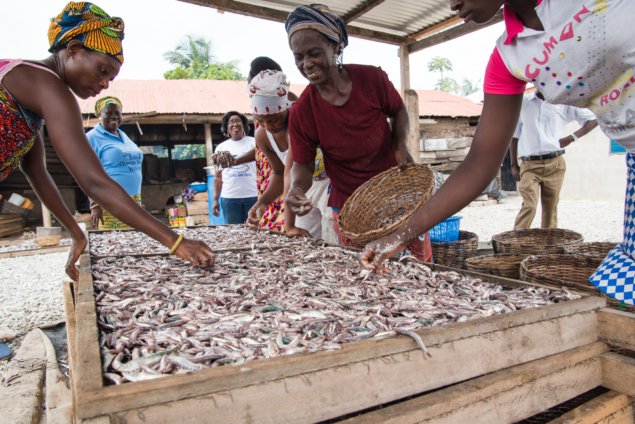The Deputy Chief of Mission at the US Embassy in Ghana Christopher J. Lamora has expressed concern about the continuous decline in Ghana’s fisheries sector.
He observes illegal, unreported, and unregulated fishing is still rampant in Ghana’s coastal waters despite efforts to stem the tide. He wants more strict enforcement of regulations.
“An unfortunate reality is that despite our best efforts over the past seven years, Ghana’s coastal fisheries sector is still in decline. Our research shows that the sardinella population has collapsed, and that the mackerel and anchovy populations are near collapse,” he noted.
“There are simply too many fishers and small vessels in the sector, too many industrial trawlers including many that hail from far beyond Ghana’s waters, and too few opportunities to move people away from fishing as a livelihood. All of this has created a situation where the livelihoods of 10 percent of Ghana’s population are in jeopardy and the protein intake of Ghana’s population may fall as a result,” Mr. Lamora added.
He was speaking at a virtual event to discuss lessons learnt after seven years of implementation of the USAID/Ghana Sustainable Fisheries Management Project (SFMP).
“It will require continued commitment and mutual accountability from all partners - the Government of Ghana, international partners, fisherfolk, and local communities - to restore the health of the sector,” he said.
Mr. Lamora said there is the need to ensure that management decisions in the sector are informed by science and data to protect the vital contributions of coastal and marine ecosystems to provide nutrition and livelihoods.
He said it has become necessary to better align the need to protect the livelihoods of Ghana’s artisanal fisherfolk with the biological health of the fish species that make these economic opportunities possible.
Mr. Lamora called for bold steps to hold accountable those actors who violate the laws and regulations that are designed to protect Ghana’s marine fisheries from collapse and safeguard the interests of the Ghanaian people.
The Sustainable Fisheries Management Project (SFMP) is a seven-year, $24 million program funded through the U.S. Agency for International Development (USAID).
Through the SFMP, the University of Rhode Island partnered with the Ministry of Fisheries and Aquaculture Development and the Fisheries Commission to strengthen data-driven decision-making, improve the fisheries sector regulatory framework, adopt responsible fishing practices to facilitate rebuilding Ghana’s marine fish stocks, and ensure viable livelihoods for fisherfolk.
The project also facilitated Ghana’s first-ever one-month closed season for the small-scale marine canoe sector in 2019 to help rebuild depleted species and launched a Canoe Identification Card system to better regulate the number of canoes active in the sector. A National Anti-Child Labor and Trafficking Strategy for the fisheries sector to combat was also launched.
Minister for Fisheries and Aquaculture Development Mavis Hawa Koomson told the session the project has led to some very important management measures that Ghana can leverage on to protect the fisheries sector and ensure food security.
“I wish to use this platform to reiterate my commitment to working with all stakeholders, fisherfolk, development partners, the USAID, to address these challenges. I know together we can change the narrative and support actions for sustainable management of Ghana’s fisheries to ensure food security and the livelihoods of fishers,” she assured.
Latest Stories
-
National Kaizen Project: Japanese volunteer helps local businesses embrace Kaizen and improve productivity in A/R
7 minutes -
AratheJay drops new single “Fire” with Bella Shmurda
17 minutes -
17 postgraduate students awarded research grants under post COVID-19 initiative
25 minutes -
LG Electronics, Rotary Club of Kumasi-Premier Intl relief Ejisu Asaman of water crises
26 minutes -
Ghana’s Alidu Seidu opens up about how football saved him from death
27 minutes -
Interpreting Article 146 of 1992 Constitution: Presidential obligations in CJ removal petitions
49 minutes -
Mahama disappointed as Chief Justice’s letter leaks before reaching him
1 hour -
Second-generation biofuels potential in Africa – Research on Non-food and waste-based biofuel production
1 hour -
Strengthening Ghana’s national biofuel policy implementation: Tailored policy recommendations
1 hour -
Mahama gives Chief Justice 10 days to respond to removal petitions
2 hours -
Michael K. Mensah: The robotics prodigy of Achimota School
2 hours -
E-Commerce practitioners applaud gov’t for repealing E-Levy, call for more support to boost sector growth
2 hours -
10 Ghanaian journalists receive training on ST&I reporting at Imperial College in London
2 hours -
KNUST expert forecasts infrastructure decline in Ashanti region due to budget cuts
2 hours -
KNUST study links poor nutrition to worsening lymphatic filariasis
2 hours

